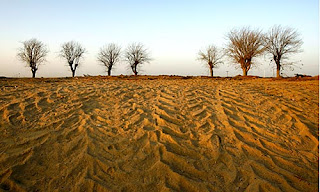
Here is another argument for establishing community gardens.
The US Bureau of Reclamation, which manages water allocation in arid regions, announced last week it will not provide vital irrigation to Central Valley farmers this year because of drought, and the California State Water Project expects to meet only 15 percent of water requests.
“That’s unheard-of,” says Jim Jasper, an almond farmer in Newman, Calif. “We’ve never seen a zero allocation for water.” Many growers here are destroying older and less productive trees to conserve water for other crops.
The University of California estimates that the drought may cause 847,000 acres to go unplanted this year, with income reductions of more than $2 billion and the loss of 70,000 jobs" (Christian Science Monitor 2/26/09).
With climate change, the precipitous fall in all commodity prices, the flight of cheap immigrant labor and the difficulty in securing credit, relying on the agricultural pipeline to continue supplying our supermarket shelves with fresh produce, dairy and grain may be a mistake. It makes sense to begin appropriating community plots now and planning for spring planting. This can do three things immediately: 1) provide local food security, 2) improve local nutrition, and 3) provided your locality successfully bids for federal relief funds, community gardens can create paying jobs. For more information on community gardens see http://www.mrsc.org/Subjects/Parks/comgarden.asp
1 comment:
Good post! I agree with you on the importance of community gardens. Extensive research, reported in Bill McKibben's book "Deep Economy" among many other places, shows that micro-farming produces significantly more food per square foot than large farms. The smaller scale depends on human labor rather than fossil-fuel driven machinery -- and hence will survive the crash. And allow humans to survive the crash.
Thanks for your good work on this site.
best,
Alison Wiley
Portland, OR
Post a Comment